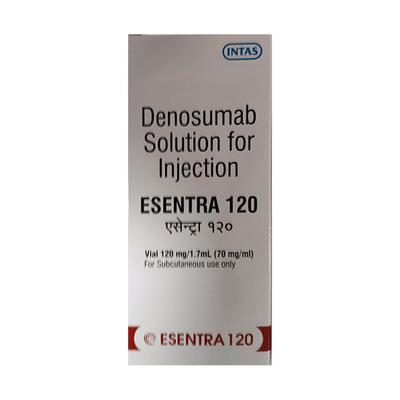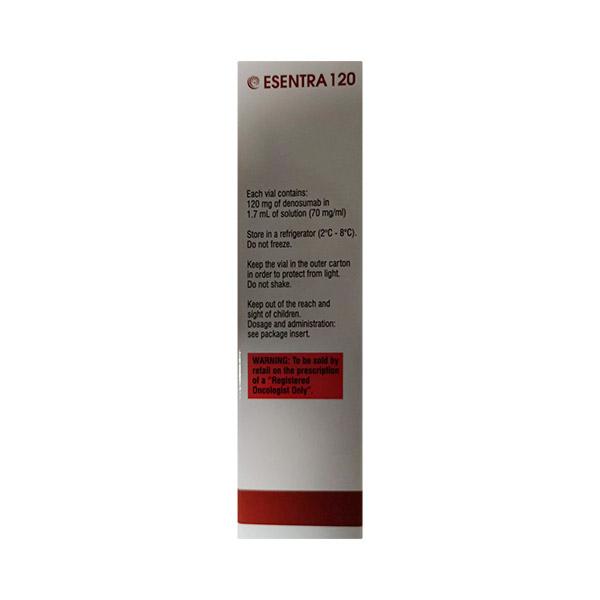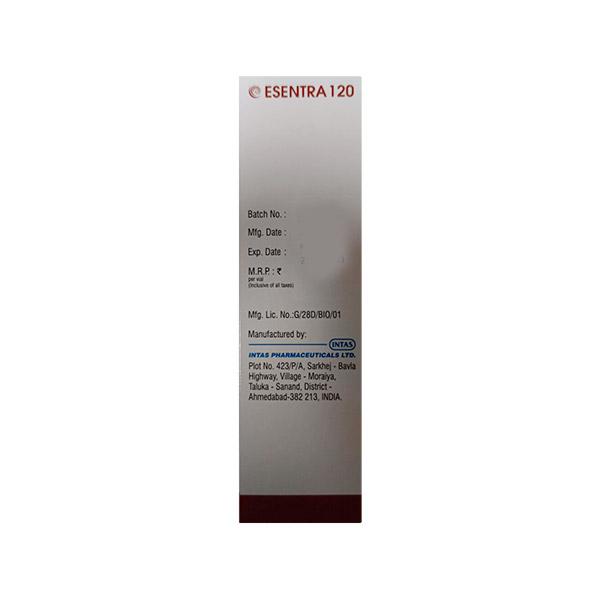

Netmeds First Membership
Quick Links
Introduction About ESENTRA 120 INJECTION
ESENTRA 120 INJECTION contains Denosumab which belongs to the group of medicines called Monoclonal antibodies. It is used in adults to manage advanced cancer and to manage serious complications caused by bone metastasis (Ex. fractures, pressure on the spinal cord, radiation therapy, or surgery). It is also used to manage giant cell tumours of the bone, which cannot be managed by surgery, especially in adults whose bones have stopped growing. Symptoms include a visible mass and bone joints being affected (fracture, fluid buildup, limited movement, swelling, and pain in the joints).
Denosumab binds to RANKL, a protein that is essential for the formation, function, and survival of osteoclasts (the cells responsible for bone resorption). It inhibits osteoclast formation, function, and survival, thereby decreasing bone resorption and increasing bone mass and strength. Along with this management, your doctor might ask you to make certain lifestyle changes, such as maintaining good oral hygiene and quitting smoking. Your doctor may ask you to undergo a dental examination before you start the management. ESENTRA 120 INJECTION is not recommended for use in patients with hypocalcemia (low calcium levels in the blood) and unhealed wounds from oral surgery. Before receiving ESENTRA 120 INJECTION, inform your doctor if you have any problems with your mouth or teeth (poor dental health, gum disease, etc.).
ESENTRA 120 INJECTION is not recommended among women who are pregnant. Consult your doctor for advice before receiving ESENTRA 120 INJECTION if you are breast-feeding. ESENTRA 120 INJECTION is not recommended for children and adolescents under 18 years of age, except for adolescents with giant cell tumours of the bone whose bones have stopped growing. The most common side effects of receiving ESENTRA 120 INJECTION are pain in the bones, joints, and muscles, shortness of breath, diarrhea, hypophosphatemia (low phosphate level), and excessive sweating.
Uses Of ESENTRA 120 INJECTION
It is used to manage:
- Giant cell tumour of bone in adults whose bones have stopped growing
- Complications caused by bone metastasis in advanced cancer (fracture, pressure on the spinal cord)
How ESENTRA 120 INJECTION Works
ESENTRA 120 INJECTION works to slow down bone destruction caused by cancer spreading to the bone (bone metastasis) or by giant cell tumour of bone.
How to use ESENTRA 120 INJECTION
ESENTRA 120 INJECTION will usually be administered to you subcutaneously (under the skin) by a doctor or nurse. You should also take calcium and vitamin D supplements while being managed with ESENTRA 120 INJECTION. Your doctor will decide the correct dose and duration for you depending on your age, body weight, and disease condition.
Side Effects Of ESENTRA 120 INJECTION
Common
- Bone, joint, and muscle pain
- Shortness of breath, excessive sweating
- Diarrhea
- Low phosphate levels in the blood (hypophosphatemia)
- Development of another form of cancer in patients with advanced cancer
Uncommon
- High calcium levels in the blood (hypercalcemia) after management stops in patients with giant cell tumours of the bone
- New or unusual pain in the hip, groin, or thigh (possible fracture of the thigh bone)
- Rash on the skin or sores in the mouth (lichenoid drug eruptions)
Rare
- Severe allergic reactions (wheezing or difficulty breathing, swelling of the face, lips, tongue, throat, or other parts of the body, rash, itching, or hives on the skin)
Stop receiving ESENTRA 120 INJECTION and contact your doctor immediately if you experience any of the following side effects:
- Osteonecrosis (persistent pain, swelling, non-healing sores, discharge in the mouth and/or jaw, numbness of the jaw, loosening of a tooth)
- Signs of low calcium levels in the blood (spasms, twitches, cramps in muscles, numbness or tingling of fingers, toes, or around the mouth; seizures, confusion, or loss of consciousness). It can also lead to a change in heart rhythm
How To Manage Side Effects
Diarrhea
Drink lots of fluids, such as water or fruit juice, to keep yourself hydrated. Do not consume any medicine on your own without consulting your doctor.
Warning & Precautions
Pregnancy
ContraindicatedESENTRA 120 INJECTION is not recommended for use if you are pregnant. If you become pregnant during management or in less than 5 months after stopping management, then consult your doctor before receiving it.
Breastfeeding
Consult your doctorIt is not known about the excretion of ESENTRA 120 INJECTION in the breast milk. Your doctor will help you decide whether to stop breast-feeding or to stop receiving the management, considering the benefits to the mother and the baby.
Driving and Using Machines
Use with CautionESENTRA 120 INJECTION has negligible influence on the ability to drive and use machines.
Kidney
Use with CautionESENTRA 120 INJECTION should be used with caution in patients with severe kidney problems, kidney failure, or who have needed dialysis in the past. Consult your doctor before receiving it.
Allergy
ContraindicatedBefore receiving ESENTRA 120 INJECTION, inform your doctor if you are allergic to denosumab.
Use In Pediatrics
ContraindicatedESENTRA 120 INJECTION is not recommended for children and adolescents under 18 years of age, except for adolescents with giant cell tumours of the bone whose bones have stopped growing. Consult your doctor before receiving it.
Others
ESENTRA 120 INJECTION is not recommended for use if you:
- Have unmanageed low levels of calcium in the blood
- Have unhealed wounds from oral surgery
Before receiving ESENTRA 120 INJECTION, inform your doctor if you:
- Have any problems with your mouth or teeth (poor dental health, gum disease, or tooth extraction)
- Have not had a dental check-up recently
- Have a habit of smoking (increases dental problems)
Interactions
A. Drug-Drug interactions:
Before receiving ESENTRA 120 INJECTION, inform your doctor if you are taking any of the following medicines:
- Another medicine containing denosumab
- Bisphosphonate (other medicines used to manage bone loss)
Overdosage:
ESENTRA 120 INJECTION will be administered to you only by a doctor or a nurse in a hospital, and so it is unlikely to receive an overdose. However, consult your doctor or nurse if you experience any unusual symptoms.
Synopsis
| Drug | : | Denosumab |
| Pharmacological Category | : | RANK ligand inhibitor |
| Therapeutic Indication | : | Giant cell bone tumour and advanced cancer by bone metastasis |
| Dosage Forms | : | Injection, prefilled syringes |
More Information
Storage
- Keep ESENTRA 120 INJECTION out of reach of children
- Store in a refrigerator at 2-8°C
FAQs About ESENTRA 120 INJECTION
Q: Can ESENTRA 120 INJECTION cause weight gain?
A: ESENTRA 120 INJECTION has not been associated with weight gain in clinical studies. It can cause peripheral edema (fluid retention) or swelling, which may lead to weight gain in some people.
Q: Is calcium needed along with ESENTRA 120 INJECTION?
A: Yes. You should also take calcium and vitamin D supplements while being managed with ESENTRA 120 INJECTION. Your doctor will discuss the right dosage with you.
Q: Can I undergo dental procedures while receiving ESENTRA 120 INJECTION?
A: If you are under dental management or will undergo dental surgery (Ex. tooth extractions), inform your doctor about it and tell your dentist that you are being managed with ESENTRA 120 INJECTION. If you wear dentures, you should make sure they fit properly. Contact your physician and dentist immediately if you experience any problems with your mouth or teeth (loose teeth, pain or swelling, or non-healing of sores or discharge).
Q: What happens after I stop receiving ESENTRA 120 INJECTION?
A: Some patients with giant cell tumours of the bone have developed high calcium levels in the blood weeks to months after stopping management. Your doctor will monitor you for signs and symptoms of high levels of calcium after you stop receiving ESENTRA 120 INJECTION.
References
1. KD. Tripathi. Hormones and Drugs Affecting Calcium Balance. Essentials of Medical Pharmacology. Eight Edition. 2019. Page –371-372.
2. Anshul Sobti, Pranshu Agrawal, Sanjay Agarwala, and Manish Agarwal. Giant Cell Tumor of Bone - An Overview [Revised in January 2016] [Accessed on 1st February 2024] https://www.ncbi.nlm.nih.gov/pmc/articles/PMC4733230/
3. Amgen Technology (Ireland) Unlimited Company. Electronic Medicines Compendium (EMC). [Revised in July 2021] [Accessed on 1st February 2024] https://www.medicines.org.uk/emc/files/pil.4675.pdf
4. Denosumab. Chemocare.[Accessed on 1st February 2024] https://chemocare.com/chemotherapy/drug-info/denosumab.aspx
Useful Diagnostic Tests
- Calcium
- Bone Strength Package
- Bone Profile-Advanced
- Bone Strength










